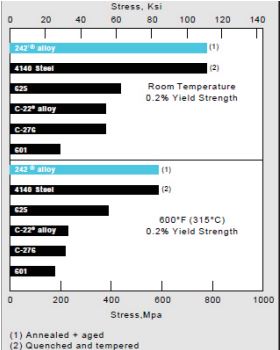HAYNES® 242® alloy for Plastics Production & Processing Tech Brief
For Plastics Production & Processing Equipment

High strength and resistance to corrosion are critical considerations in the selection of materials for plastics production and processing equipment, and both are hallmark features of HAYNES® 242® alloy from Haynes International, Inc. With twice the strength of traditional HASTELLOY® alloys up to 1200°F (650°C), and excellent resistance to fluoride and chloride process environments, 242® alloy offers performance unmatched by any other material. Field-tested applications to date include extrusion screws and cylinders, film dies, screen housing, injection molding dies, and sensor components, all used in the production and processing of polymers such as PVDF and PTFE.
242® alloy is an age-hardenable material which is usually supplied in the annealed condition. For component applications where even higher strength and additional resistance to wear are desired, 242® alloy can be supplied in a cold-worked condition. When aged, this will afford room temperature hardness levels of Rockwell C50 or more, and yield strength approaching 200 Ksi (1380 MPa). Component machining has been successfully performed in the annealed, annealed + aged, and as-cold-worked conditions.
| Aqueous Corrosion Resistance | ||||
| Alloy | 48% HF 175°F (79°C) | 10% HCl 219°F (104°C) | ||
| – | mpy | mmpy | mpy | mmpy |
| 242® | 32 | 0.8 | 22 | 0.6 |
| C-22® | 27 | 0.7 | 400 | 10.2 |
| C-276 | 37 | 0.9 | 288 | 7.3 |
| 600 | 68 | 1.7 | >4000 | >100 |
| 625 | >1500 | >38 | 642 | 16.3 |
MPY = mils per year MMPY = mm per year
Nominal Composition
| Nickel | Balance |
| Molybdenum | 25 |
| Chromium | 8 |
| Iron | 2 max. |
| Cobalt | 2.5 max. |
| Manganese | 0.8 max. |
| Silicon | 0.8 max. |
| Aluminum | 0.5 max. |
| Carbon | 0.03 max. |
| Boron | 0.006 max. |
| Copper | 0.5 max. |
Typical Tensile Properties, Plate
| Test Temperature | 0.2%Yield Strength | Ultimate Tensile Strength | Elongation | |||
| °F | °C | ksi | MPa | ksi | MPa | % |
| RT | RT | 113 | 780 | 184 | 1270 | 38 |
| 800 | 425 | 80 | 555 | 156 | 1075 | 44 |
| 1000 | 540 | 70 | 480 | 145 | 1000 | 47 |
| 1200 | 650 | 76 | 525 | 137 | 945 | 38 |
| 1400 | 760 | 42 | 290 | 106 | 730 | 66 |
| 1600 | 870 | 40 | 275 | 69 | 475 | 56 |
| 1800 | 980 | 28 | 190 | 41 | 285 | 65 |
Typical Rupture Strength, Plate
| Test Temperature | Typical Rupture Properties: | ||||||
| 10 h | 100 h | 1,000 h | |||||
| °F | °C | ksi | MPa | ksi | MPa | ksi | MPa |
| 1000 | 540 | 160 | 1105 | 140 | 965 | 120 | 825 |
| 1100 | 595 | 130 | 895 | 110 | 760 | 93 | 640 |
| 1200 | 650 | 105 | 725 | 90 | 620 | 75 | 515 |
| 1300 | 705 | 86 | 595 | 69 | 475 | 35 | 240 |
| 1400 | 760 | 59 | 425 | 29 | 200 | 17 | 115 |
Typical Mean Coefficient of Expansion
| °F | °C | µin/in | µm/m |
| RT | RT | – | – |
| 800 | 400 | 6.7 | 11.9 |
| 1000 | 550 | 6.8 | 12.3 |
| 1100 | 600 | 6.8 | 12.3 |
| 1200 | 650 | 6.9 | 12.4 |
| 1300 | 700 | 7.2 | 130 |
Typical Room Temperature Physical Properties
| Physical Property | British Units | Metric Units |
| Density |
0.327 lb/in3 |
9.06 g/cm3 |
| Electrical Resistivity | 48.0 µohm-in | 122.0 µohm-cm |
| Modulus of Elasticity |
33.2 x 106 psi |
229 GPA |
| Thermal Conductivity |
75.7 Btu-in/ft2-h-°F |
11.3 W/m-°C |
| Specific Heat | 0.092 Btu/lb-°F | 386 J/Kg-°C |
Environmental Resistance
Oxidation Resistance – Excellent to 1400°F (760°C)
Gaseous Fluorine & HF – Excellent to 1650°F (900°C)
Molten Chloride/Fluoride Salts – Excellent to 1650°F (900°C)
Chloride Stress Cracking Resistance – Excellent
Chlorination – Excellent in Reducing Environments
Hydrogen Embrittlement Resistance – Fair to Good

 en
en